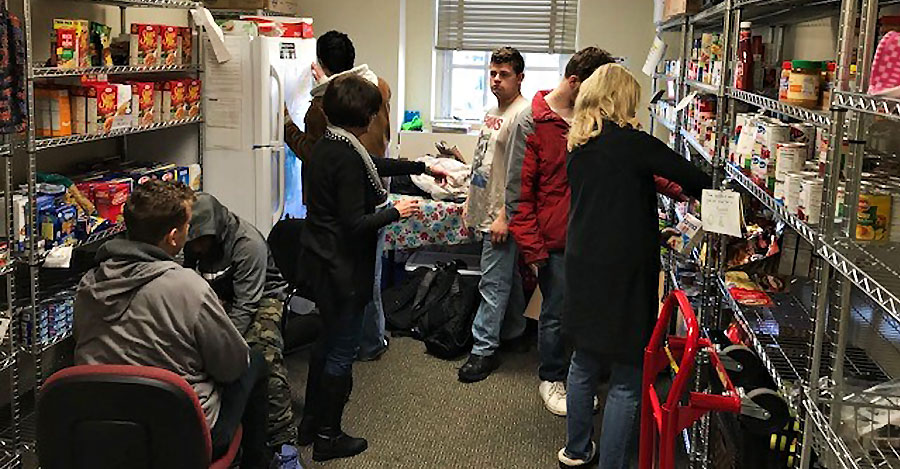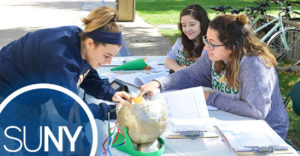
According to the United States Department of Agriculture Economic Research Service, food insecurity is a household-level economic and social condition of limited or uncertain access to adequate food. Food insecurity also affects college students, and a recent study from HOPE Lab highlights this fact: roughly 36 percent of students attending four-year schools and 42 percent of two-year students had “low” or “very low” food security in the period surveyed. At SUNY, it has always been part of our mission to provide student support and outreach, as we’ve had food banks and other food security resources on our campuses for a number of years.
We’re happy to report that currently, 94% of SUNY campuses have food pantries or partnerships in place, and we plan to reach the 100% mark by the end of 2018. These efforts work hand in hand with New York State’s commitment to food security. Coincidentally, this past year, Governor Andrew Cuomo made statewide food security an issue of focus, as in his 2017 State of the State address, he announced the launch of the”No Student Goes Hungry Program,” a comprehensive program to provide all students with access to healthy, locally sourced meals from kindergarten to college. The call for food pantries on all SUNY campuses by the end of 2018 was a challenge our schools were ready and able to meet head on.
In addition to establishing food pantries at all of our 64 colleges and universities, SUNY formed a Food Insecurity Task Force this past March. The goal of the Task Force is to study the issue of food insecurity on college campuses and recommend the necessary changes and best practices to alleviate this serious issue. Comprised of higher education leaders and students from across the university system, along with experts in the fields of diet and nutrition, campus food service, financial aid, food waste prevention, and nutritional research scientists, among others, the group will also build resources and support in alignment with Governor Cuomo’s “No Student Goes Hungry Program.”
A full table of dedicated @SUNY students, faculty & staff kicking off the Food Insecurity Task Force—awed by the amazing, impactful work that is happening across the state to address #hunger & #basicneeds! #RealCollege pic.twitter.com/EuVwZK2h7B
— Anne Kress (@MCCPresident) March 29, 2018
The Task Force is coordinated by Associate Provost of Student Affairs Dr. John L. Graham and is co-chaired by Monroe Community College President Anne M. Kress and Food Bank Association of New York State Executive Director Anita M. Paley. It also includes representatives from SUNY’s 64 campuses and the following organizations: Food Bank Association of New York State, University Faculty Senate, auxiliary service corporations, Regional Food Bank of Northeastern New York, City Harvest, SUNY Student Assembly, and the SUNY Board of Trustees Student Life Committee.
To achieve its overarching goal of better understanding food insecurity on college campuses and how to combat this issue, the Task Force has four subcommittees: Student Life, Resources, Engagement, and Pantries and Partnerships. Each subcommittee has specific areas of focus:
- Student Life: assessment and tracking, bridging gaps in transition, outreach and awareness
- Resources: data collection, dining services relationships, awareness campaign
- Engagement: student and faculty engagement, normalizing and reducing stigma, SUNY-wide marketing
- Pantries and Partnerships: institutional buy-in, dietary and cultural considerations, regional food insecurity summits
To solve the issue of food insecurity, the focus needs to be wide, which is why partners are needed. In terms of partnerships, the Task Force is collaborating with a number of statewide and out of state organizations, such as the Hope Center for College, Community, and Justice; the Council on Hunger and Food Policy; the Office of Temporary and Disability Assistance; SUNY/CUNY Student Affairs Summit: Student Food Insecurity; and SUNY’s Community College Community Schools program. These partnerships with student groups, community organizations, national advocacy groups, and more will help us achieve our mission of making sure that no student goes hungry or without nutritious food. And as best stated by Chancellor Johnson, food insecurity does not discriminate.
“Food insecurity can affect anyone, including the students enrolled in our campuses. Under the Governor’s leadership and with incredible support from all 64 SUNY campuses and partnerships across the state, we are quickly changing not only the conversation about hunger on our campuses, but how we support our students in critical need. Together, we are providing needed nutrition, ending the stigma around food insecurity, and helping ensure no student is forced to drop out because of limited access to the healthy food they need.”
The efforts at SUNY have been underway for a long time, and they continue to get stronger and more focused, until no student has to worry about going hungry in college. When students are supported, they succeed.



